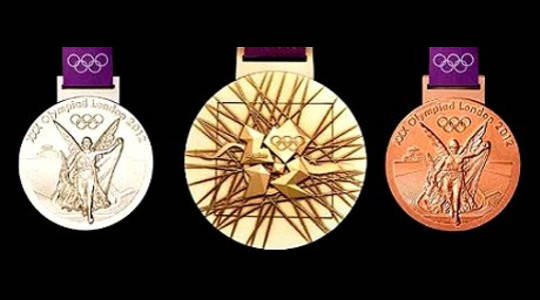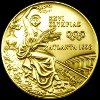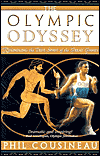
Where's the gold? Or as the agent cries out in the movie Jerry McGuire, "Where's the money? Show me the money!"
Show me the money! Is this any way to measure our greatest efforts, our striving for excellence? Is there no purpose, no satisfaction, in silver or bronze, in second or third or last place? No gold, no glory — no endorsement contract," as one previous Olympic silver medalist bitterly complained.
Gold's Mythic Image: Winning At All Costs
To believe in the exact equation of gold and success is to commit what depth psychologist James Hillman calls "the sin of literalism." How can our athletes and coaches escape the trap of concretizing gold's mythic image, which leads inexorably to winning at any cost, and to debilitating shame for anyone who is not crowned a champion? Is there another image of gold that could lead us back to the Games' true spirit?
One ingenious alternative has been suggested by modern-day peripatetic [Aristotelian] philosopher Ronald Gross. In his seminars around the world, he regales audiences with accounts of the ambiguous feelings Socrates sparked in the citizens of Athens. Socrates' friends were always at a loss when it came to introducing the homely and unkempt philosopher to others:
"They explained that Socrates was like the little statues of the [wise satyr] Silenus, which Athenian craftsmen sold in the agora. These plaster figures portrayed an ugly, drunken, dissolute, paunchy figure. But inside some of these little figurines, the sculptors imbedded a lovely golden figurine. The problem was that to discover the possible prize within your Silenus you had to be willing to break it open, smashing through the external mold to get at the inner treasure. Getting to know Socrates was like that, his friends said. You needed to be willing to get past the external appearance, to appreciate the soul within."
Finding the Inner Gold by Strengthening Body and Soul
 Socrates relished his role as social gadfly. To politicians, generals, athletes, and storekeepers alike he broke the bad news that they weren't as wise or successful as they thought. Our lives have a deeper purpose, he insisted, and to discover it we must dig below superficial appearances and discover what really matters, the inner gold. To do this he advocated strengthening both body and soul.
Socrates relished his role as social gadfly. To politicians, generals, athletes, and storekeepers alike he broke the bad news that they weren't as wise or successful as they thought. Our lives have a deeper purpose, he insisted, and to discover it we must dig below superficial appearances and discover what really matters, the inner gold. To do this he advocated strengthening both body and soul.
A carrier of the Socratic torch in our time is John Wooden, the most successful basketball coach in history. He would rarely speak about winning to his players or the media; instead he emphasized sports as a way of strengthening character and preparing yourself for the greater game of life. Similarly, Vince Lombardi emphasized: "The spirit, the will to win, and the will to excel are the things that endure. These qualities are much more important than the events that occur." As playfully as ever, comedienne Mae West agreed: "The score never interested me, only the game."
For those who contend that de-emphasizing winning may lead to a losing attitude, the annals of Olympic lore are full of passages from champions who argue the contrary. Four-time gold medalist John Naber writes,
"The motto of the Olympic movement doesn't idolize the excellent, it encourages the devoted . . . Their wonderful and enlightening stories bring to life the timeless truths inherent in the pursuit of excellence through hard work, discipline and strong character. The message hidden just beneath the surface . . . is that Olympic champions are not extraordinary people, rather, they are ordinary people who merely have been able to accomplish extra-ordinary things."
The Quest for Excellence: The Deeper Meaning of the Olympic Competitions
Gold-medal-winning gymnast Kerri Strug has openly discussed the need to see through the superficial glamour of the Olympics to discover their deeper meaning. "Everyone is focusing on `You're an Olympic champion,' but it's a lot more than that," she said. "We are representing our sport. We have a larger role to play... Gymnastics taught me how to be focused and disciplined, which helped me prepare for life."
What does a mythic reading of excellence mean in the current world of high-stakes competition, where winning a gold medal can lead to millions of dollars in endorsements? Who are the torch-bearers of excellence in the recent Olympiads, and what life lessons can we learn from them?
To find them, John Naber writes in Awakening the Olympian Within, we need only search for the "stories of determination — where Olympians had a reason for giving up, but never did." As an Olympics broadcaster he discovered that viewers remembered those performances more than others. "What do these Olympians share in common besides their medals? They share an undying faith in the eventual positive outcome and an unwillingness to give up."
Reprinted with permission of the publisher,
The Theosophical Publishing House. ©2003. www.questbooks.net
Article Source
 The Olympic Odyssey: Rekindling the True Spirit of the Great Games
The Olympic Odyssey: Rekindling the True Spirit of the Great Games
by Phil Cousineau.
Info/Order this book.
About the Author
PHIL COUSINEAU, author of numerous books, is an award-winning documentary filmmaker who lectures worldwide on topics such as mythology and creativity. His fascination with the art, literature, and history of culture has taken him from Michigan to Marrakesh, Iceland to the Amazon, in a worldwide search for what the ancients called the "soul of the world." With more than 25 books and 15 scriptwriting credits to his name, the "omnipresent influence of myth in modern life" is a thread that runs through all of his work.

























